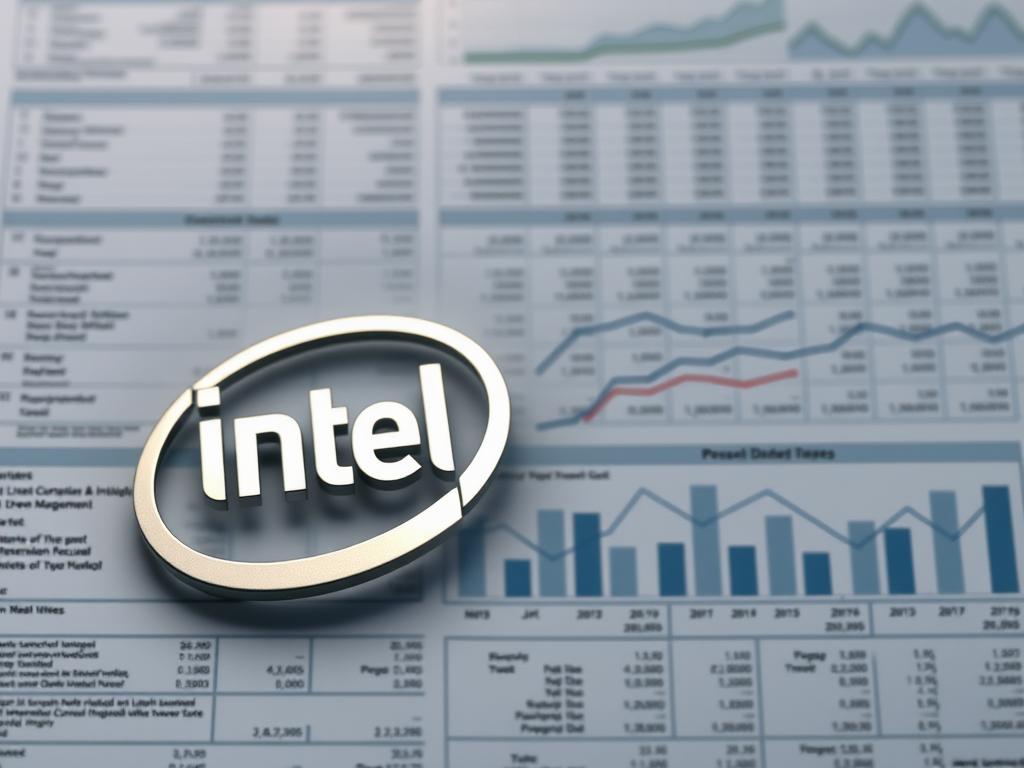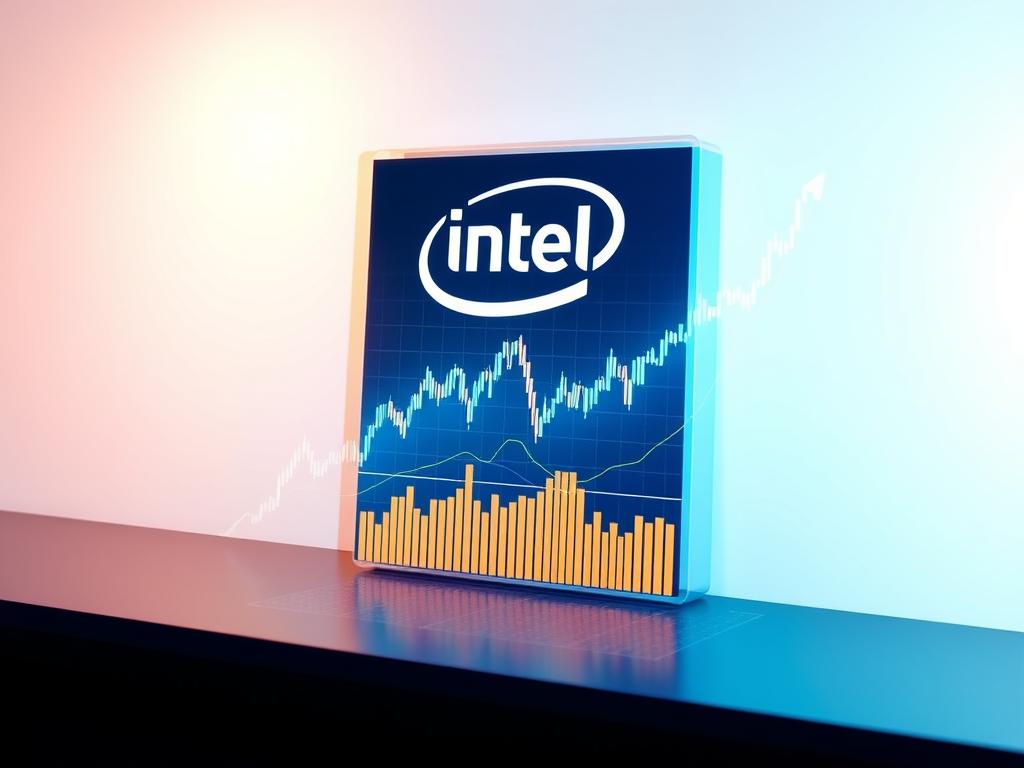Intel’s stock has seen a big jump after CEO Pat Gelsinger shared his plans for change. Investors are excited about the detailed roadmap to boost Intel’s place in the chip market.
Gelsinger’s plans focus on innovation and making things better. He wants to spend more on research, change how things are made, and improve technology.
People are really optimistic about Intel’s chances to lead again. The stock going up shows they believe Intel can keep up in the tough chip market.
Key Takeaways
- Intel stock experiences positive momentum with new strategic direction
- CEO Pat Gelsinger introduces comprehensive transformation strategy
- Significant investments planned in R&D and manufacturing
- Market demonstrates renewed confidence in Intel’s future
- Strategic changes aim to restore technological competitive edge
Breaking Down Intel’s Recent Stock Performance
Intel’s stock has seen ups and downs. This shows how the market and investors feel about the company. Looking at Intel’s recent moves helps us understand its financial health and where it stands in the market.
Looking at trading volumes and market indicators gives us a full picture of Intel’s financial state. Investors keep an eye on several important factors:
- Daily trading volumes
- Price trend fluctuations
- Comparative market performance
Key Market Indicators and Trading Volumes
Intel, a big player in semiconductors, has seen big changes in its trading patterns. Recent data shows some key trends in Intel’s stock:
| Metric | Recent Value | Previous Quarter |
|---|---|---|
| Average Daily Trading Volume | 35.2 million | 29.6 million |
| Price Volatility | 12.5% | 9.8% |
| Market Sentiment Index | Neutral to Positive | Neutral |
Historical Price Analysis and Trends
Looking at Intel’s past prices gives us a detailed view of its value in the market. The stock has shown strength despite tough times. Recent big moves have caught the eye of investors.
Investor Sentiment Shifts
Investor feelings about Intel are changing. More people now see Intel’s chance to lead in tech and strategic moves. Experts are keeping a close eye as Intel deals with the complex world of semiconductors.
“Intel’s strategic moves are creating a renewed sense of potential in the market,” noted a leading semiconductor industry analyst.
The Market Most Excited Intel Stock Rises on Report New CEO Plans Big Changes
Investors are excited as Intel’s stock goes up. This is because new CEO Pat Gelsinger has big plans. The market is watching closely as Intel changes its strategy.
What’s making everyone so excited? Here are a few reasons:
- Comprehensive restructuring of manufacturing strategies
- Aggressive investment in research and development
- Potential breakthrough in semiconductor technology
The stock rise shows investors believe in Gelsinger’s plan. They think he can make Intel stronger. Analysts like the bold moves to fix Intel’s old problems.
The market sees these strategic moves as a potential game-changer for Intel’s future in the semiconductor industry.
Everyone is waiting to see if these plans will work. The semiconductor landscape is evolving rapidly. Intel’s quick action might just turn things around.
Experts think these changes could make Intel a leader again. They believe it could also make shareholders happy in the future.
Pat Gelsinger’s Vision for Intel’s Future
Intel is changing under CEO Pat Gelsinger’s leadership. He wants to make Intel a top player in semiconductors. He plans to do this with a new manufacturing strategy and new technologies.
Gelsinger has a clear plan for Intel’s future. It focuses on three main areas:
- Aggressive manufacturing strategy redesign
- Substantial R&D investment
- Proactive competition response mechanisms
Manufacturing Strategy Overhaul
The new manufacturing plan is all about making better semiconductors. Intel plans to use the latest technology for more efficient chips. This move is to keep up with the competition.
“We’re transforming Intel from a vertically integrated manufacturing company to a more flexible, innovative technology provider.” – Pat Gelsinger
Investment in Research and Development
Gelsinger also wants to invest a lot in R&D. This will help Intel catch up with its rivals. It could even lead to new ways of making semiconductors.
Competition Response Plans
Intel’s plan to stay ahead involves quick tech updates. The company is working on faster development and partnerships. This will help it compete with AMD and TSMC.
With these plans, Pat Gelsinger is working to make Intel a leader again. He aims to lead in future semiconductor innovations.
Intel’s Position in the Global Semiconductor Market
Intel is a big name in the global semiconductor market. It keeps up with the competition, even when things get tough. The company’s share of the market has changed a lot, showing how fast and competitive the field is.
Intel stands out in several ways:
- Dominant presence in the x86 processor market
- Strong research and development capabilities
- Extensive manufacturing infrastructure
- Strategic investments in advanced semiconductor technologies
Intel’s share of the semiconductor market has faced challenges from AMD and TSMC. The company is working hard to get back on top. It’s investing a lot in making chips better and in new technologies.
The world of semiconductors is always changing. Intel is keeping up by focusing on new ideas and better ways to make chips. This helps Intel stay ahead and keep its reputation as a leader in tech.
“Innovation is our pathway to sustained market relevance” – Intel Leadership Strategy
Intel is making big changes in how it makes semiconductors. This could change its place in the market in the next few years.
Strategic Shifts in Manufacturing Capabilities
Intel is starting a big change to boost its manufacturing skills. It’s tackling big challenges in the chip world. The company is focusing on several key areas to get stronger and lead in tech.
Several important steps will change Intel’s making chips world:
Arizona Fab Expansion
The Arizona fab is a big step for Intel’s making chips in the US. It’s in Phoenix and will help make more advanced chips. The main points are:
- Billions of dollars are being spent on it.
- It will create thousands of new jobs.
- It will help make the latest chip technology.
Technology Node Advancement Plans
Intel is working hard to stay ahead in chip technology. They have a plan to:
- Get to 3nm and 2nm chip sizes faster.
- Use new packaging methods.
- Make transistors smaller for better performance.
Supply Chain Improvements
Intel knows how important a strong supply chain is. They’re making big changes to make it better. The main goals are:
- Not relying on just one supplier.
- Working with local and regional partners.
- Improving how they manage and store chips.
These changes show Intel’s dedication to being a leader in making chips. They’re setting themselves up for future growth and new ideas.
Financial Impact of Restructuring Initiatives

Intel’s restructuring is a big move with big financial effects. The company is doing a deep cost analysis to make its operations better and more competitive. Intel wants to improve its financial health and tackle recent tech sector challenges with smart financial plans.
The financial impact of Intel’s restructuring covers several important areas:
- Workforce optimization and possible cuts in expenses
- Changing how it spends on research and development
- Making manufacturing processes more efficient
- Lowering costs in many areas
Intel thinks its restructuring will save a lot of money. The company hopes to save between $3 billion to $4 billion each year by 2025. These savings will help fund new tech innovations and keep Intel competitive in the global chip market.
Our restructuring is not just about cutting costs, but strategically repositioning Intel for long-term growth and innovation.
Intel’s financial plan includes careful budgeting and smart investments. The company’s leaders are closely looking at each department’s performance to find ways to improve. By using data to guide its restructuring, Intel aims to increase shareholder value and invest in key tech advancements.
Investors and market experts are keeping a close eye on these changes. They see Intel’s restructuring as a key moment in the company’s journey. The chance for better financials and leading in tech makes these efforts very interesting.
Competitive Analysis Against AMD and TSMC
The semiconductor industry is a battlefield where Intel, AMD, and TSMC constantly vie for technological supremacy. My analysis reveals a complex landscape of market share dynamics and strategic competition that defines the current technological ecosystem.
In the Intel vs AMD rivalry, several key factors emerge that shape their competitive landscape:
- Market share dynamics show fluctuating performance between the two semiconductor giants
- Technology gap remains a critical battleground for technological innovation
- Strategic advantages differ in processor design and manufacturing capabilities
Market Share Dynamics
The current semiconductor market presents a nuanced picture of competition. Intel traditionally dominated processor manufacturing, yet AMD has gained significant ground in recent years. My research indicates a shifting landscape where market share is increasingly contested.
Technology Gap Assessment
When examining the Intel vs TSMC technological capabilities, critical differences become apparent. TSMC’s advanced manufacturing nodes have positioned them as a leading semiconductor foundry, challenging Intel’s historical technological advantages.
Strategic Advantages and Challenges
Each company brings unique strategic advantages to the market. Intel’s vertically integrated model contrasts with TSMC’s pure-play foundry approach. AMD has leveraged innovative design strategies to compete effectively against both semiconductor titans.
The semiconductor industry remains a dynamic arena of constant technological evolution and strategic positioning.
Investment Community Response and Analyst Ratings

The investment world is watching Intel closely. Analyst ratings show more people are hopeful about the company’s future. This change is due to Intel’s big plans to change its direction.
Investors have a lot to say about Intel:
- Many big financial firms have changed their views on Intel’s stock.
- Big investors are now more confident in Intel’s big changes.
- Analyst ratings have slowly but surely gotten better.
Top analysts say Intel’s big bets on making semiconductors and research are key. The company’s focus on new tech has really caught the eye of experts. They see a lot of value in the long run.
Wall Street’s top firms have mixed but mostly good views on Intel. They look at Intel’s big goals and its challenges. This gives a fair view of where Intel stands in the market.
Intel’s big change is a key moment for leading in semiconductors and winning back investors.
The investment world is always changing. Intel’s ratings show a mix of hope and caution. People think Intel can get back on top in the global semiconductor market.
Impact on Intel’s Global Workforce and Operations
Intel is making big changes in its global operations and workforce. The company is restructuring in every area, from making chips to researching new technologies.
The changes in Intel’s workforce will bring both challenges and chances. Here are some key points:
- Potential job restructuring across multiple global locations
- Increased investments in high-tech manufacturing roles
- Targeted skill development programs
- Strategic reallocation of human resources
Intel’s global operations will see big changes. Employees are cautiously optimistic. They see the need to adapt to the competitive semiconductor market.
| Region | Workforce Impact | Expected Changes |
|---|---|---|
| United States | High-Tech Job Creation | Expansion of semiconductor manufacturing |
| Asia | Technological Upskilling | Advanced research and development roles |
| Europe | Strategic Realignment | Enhanced innovation centers |
The strategic workforce transformation reflects Intel’s commitment to maintaining its competitive edge in the global semiconductor market.
Intel’s approach demonstrates a proactive stance in managing technological disruption through targeted workforce development.
Conclusion
Intel’s recent stock performance shows a key turning point in the semiconductor world. Pat Gelsinger’s leadership has brought back investor interest, hinting at a big change for the tech giant. The future looks bright for Intel, thanks to smart investments and new tech.
Investors need to keep an eye on Intel’s big restructuring plans. The tech world is fast-changing, and Intel is ready to meet these challenges. With more research and new factories in Arizona, Intel is working hard to stay ahead.
Market analysts are cautiously optimistic about Intel’s stock. Despite tough competition from AMD and TSMC, Intel’s new direction under Gelsinger is promising. Investors should watch how well Intel follows its big plans for tech and manufacturing.
Intel is at a crucial point in its journey. Its success will depend on its ability to innovate, close tech gaps, and make smart investments. The fast-changing tech world is watching, and Intel’s path suggests it could regain its top spot.

1 thought on “Intel Stock Rises on CEO’s Plans for Big Changes”